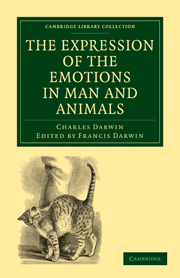Book contents
- Frontmatter
- PREFACE TO THE SECOND EDITION
- Contents
- LIST OF ILLUSTRATIONS
- INTRODUCTION
- CHAP. I GENERAL PRINCIPLES OF EXPRESSION
- CHAP. II GENERAL PRINCIPLES OF EXPRESSION—continued
- CHAP. III GENERAL PRINCIPLES OF EXPRESSION—concluded
- CHAP. IV MEANS OF EXPRESSION IN ANIMALS
- CHAP. V SPECIAL EXPRESSIONS OF ANIMALS
- CHAP. VI SPECIAL EXPRESSIONS OF MAN: SUFFERING AND WEEPING
- CHAP. VII LOW SPIRITS, ANXIETY, GRIEF, DEJECTION, DESPAIR
- CHAP. VIII JOY, HIGH SPIRITS, LOVE, TENDER FEELINGS, DEVOTION
- CHAP. IX REFLECTION—MEDITATION—ILL-TEMPER—SULKINESS—DETERMINATION
- CHAP. X HATRED AND ANGER
- CHAP. XI DISDAIN — CONTEMPT — DISGUST — GUILT — PRIDE, ETC. — HELPLESSNESS — PATIENCE — AFFIRMATION AND NEGATION
- CHAP. XII SURPRISE—ASTONISHMENT—FEAR—HORROR
- CHAP. XIII SELF-ATTENTION—SHAME—SHYNESS—MODESTY: BLUSHING
- CHAP. XIV CONCLUDING REMARKS AND SUMMARY
- INDEX
- Plate section
CHAP. VIII - JOY, HIGH SPIRITS, LOVE, TENDER FEELINGS, DEVOTION
Published online by Cambridge University Press: 07 September 2010
- Frontmatter
- PREFACE TO THE SECOND EDITION
- Contents
- LIST OF ILLUSTRATIONS
- INTRODUCTION
- CHAP. I GENERAL PRINCIPLES OF EXPRESSION
- CHAP. II GENERAL PRINCIPLES OF EXPRESSION—continued
- CHAP. III GENERAL PRINCIPLES OF EXPRESSION—concluded
- CHAP. IV MEANS OF EXPRESSION IN ANIMALS
- CHAP. V SPECIAL EXPRESSIONS OF ANIMALS
- CHAP. VI SPECIAL EXPRESSIONS OF MAN: SUFFERING AND WEEPING
- CHAP. VII LOW SPIRITS, ANXIETY, GRIEF, DEJECTION, DESPAIR
- CHAP. VIII JOY, HIGH SPIRITS, LOVE, TENDER FEELINGS, DEVOTION
- CHAP. IX REFLECTION—MEDITATION—ILL-TEMPER—SULKINESS—DETERMINATION
- CHAP. X HATRED AND ANGER
- CHAP. XI DISDAIN — CONTEMPT — DISGUST — GUILT — PRIDE, ETC. — HELPLESSNESS — PATIENCE — AFFIRMATION AND NEGATION
- CHAP. XII SURPRISE—ASTONISHMENT—FEAR—HORROR
- CHAP. XIII SELF-ATTENTION—SHAME—SHYNESS—MODESTY: BLUSHING
- CHAP. XIV CONCLUDING REMARKS AND SUMMARY
- INDEX
- Plate section
Summary
Joy, when intense, leads to various purposeless movements—to dancing about, clapping the hands, stamping, &c, and to loud laughter. Laughter seems primarily to be the expression of mere joy or happiness. We clearly see this in children at play, who are almost incessantly laughing. With young persons past childhood, when they are in high spirits, there is always much meaningless laughter. The laughter of the gods is described by Homer as “the exuberance of their celestial “joy after their daily banquet.” A man smiles—and smiling, as we shall see, graduates into laughter— at meeting an old friend in the street, as he does at any trifling pleasure, such as smelling a sweet perfume. Laura Bridgman, from her blindness and deafness, could not have acquired any expression through imitation, yet when a letter from a beloved friend was communicated to her by gesture-language, she “laughed and clapped “her hands, and the colour mounted to her cheeks.” On other occasions she has been seen to stamp for joy.
Idiots and imbecile persons likewise afford good evidence that laughter or smiling primarily expresses mere happiness or joy. Dr. Crichton Browne, to whom, as on so many other occasions, I am indebted for the results of his wide experience, informs me that with idiots laughter is the most prevalent and frequent of all the emotional expressions. Many idiots are morose, passionate, restless, in a painful state of mind, or utterly stolid, and these never laugh.
- Type
- Chapter
- Information
- The Expression of the Emotions in Man and Animals , pp. 207 - 231Publisher: Cambridge University PressPrint publication year: 2009First published in: 1890



